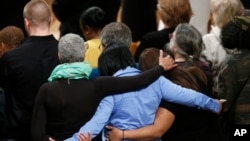A study by U.S. scientists has found that media reports of mass killings and school shootings increase the incidence of similar events.
A report published Thursday in the journal PLOS One finds events of mass violence spread "contagiously," and that 20 to 30 percent of such killings appear to be the result of "infection."
The contagion period lasts about 13 days, researchers found.
Under this model, for every three mass killings, an average of one more happens. And for every four or five school shootings — including those with no fatalities — another shooting takes place.
But the study found the risk of a copycat shooting was temporary and appeared to fade after the two-week mark.
The spread they found was not dependent on location, leading researchers to believe that national media coverage of a mass shooting might play a role. On average, mass shootings occur about once every two weeks in the United States, and school shootings happen about once a month, the study said.
Researchers also found that states with higher gun ownership were more likely to have mass killings and school shootings. States with tighter firearms laws had fewer mass shootings.
The report came after a widely publicized shooting at a black church in Charleston, South Carolina, where authorities said Dylann Roof, 21, admitted to killing nine African-Americans on June 17, including the Reverend Clementa Pinckney, a state senator.
Previous research has found that suicides can be contagious among young people, particularly when the details of the method used are publicized.
"The hallmark of contagion is observing patterns of many events that are bunched in time, rather than occurring randomly in time," said lead author Sherry Towers, research professor in the Arizona State University Simon A. Levin Mathematical, Computational and Modeling Sciences Center.
The study did not delve into the motives of the shootings.





